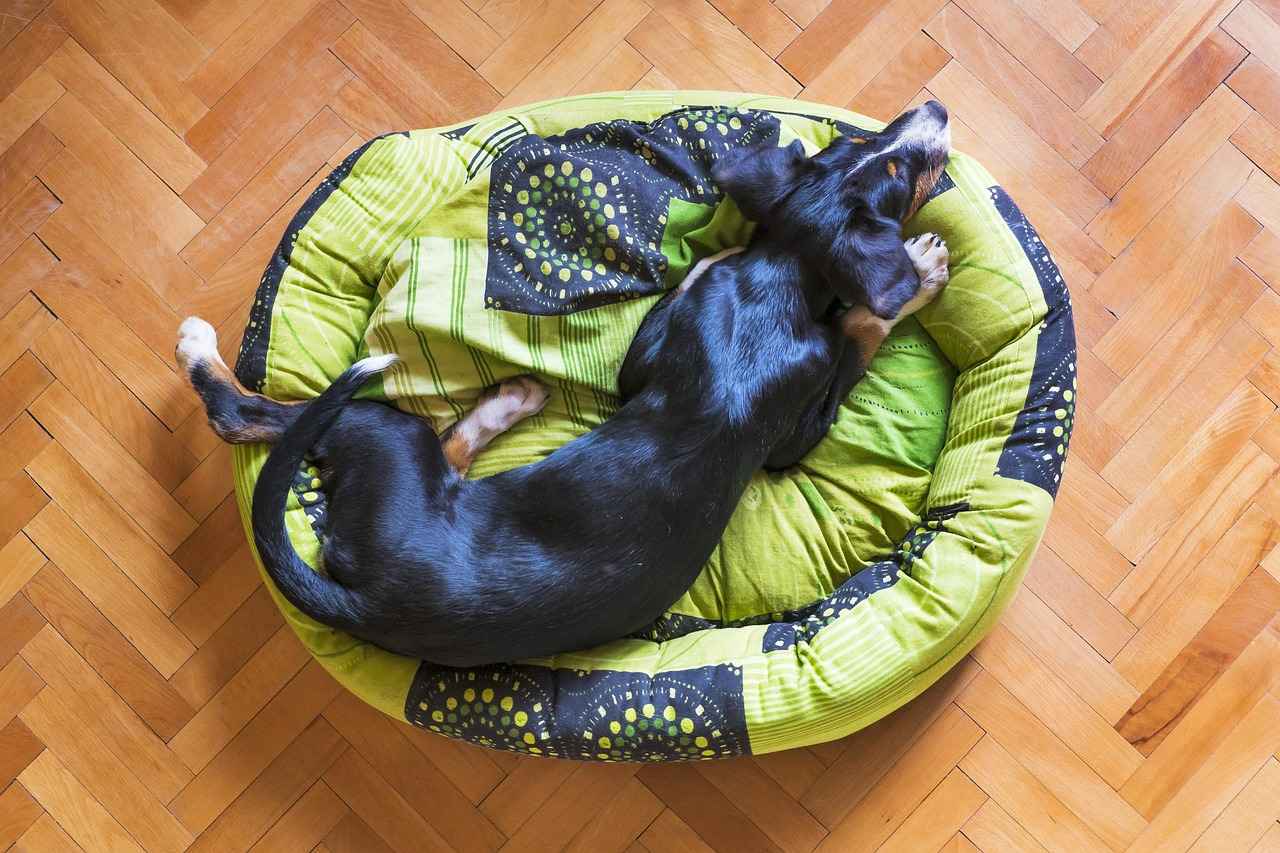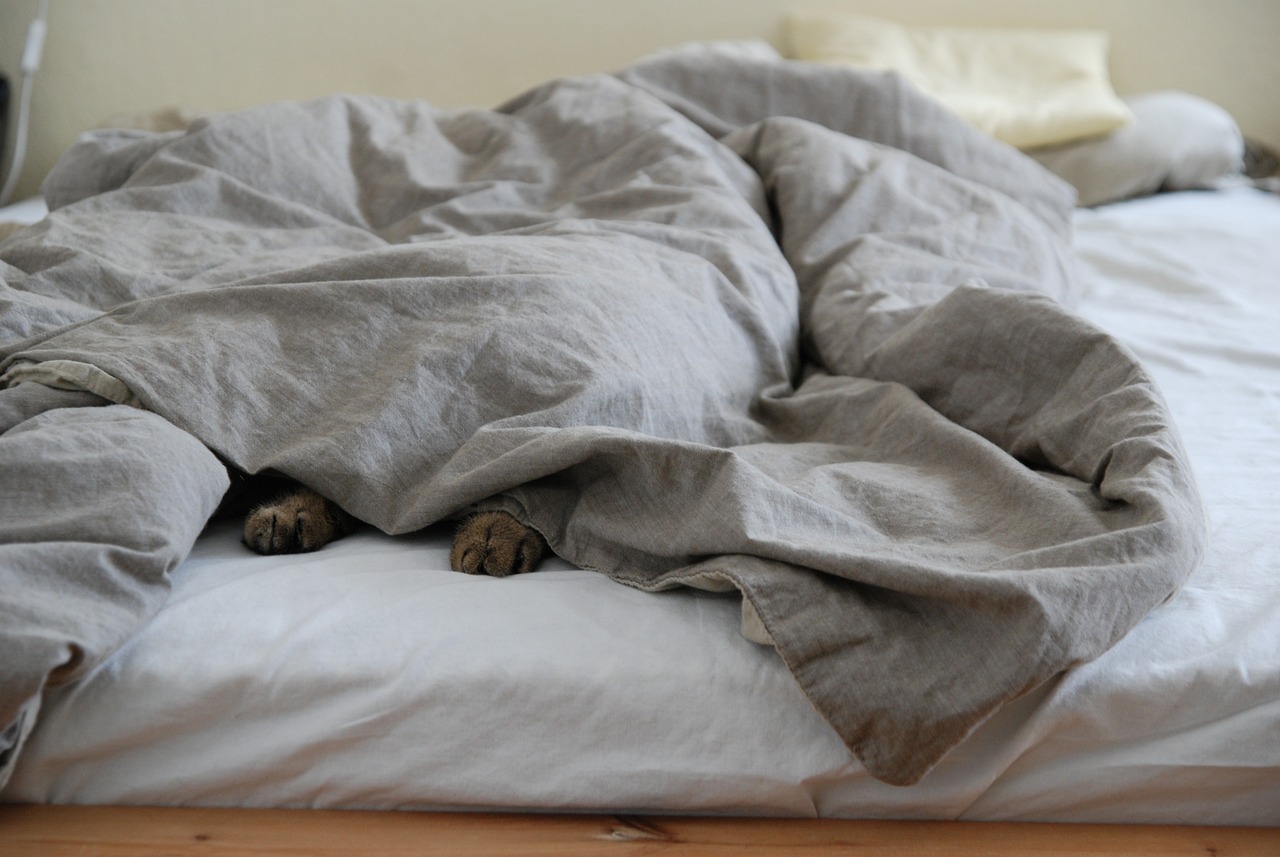This article delves into the reasons behind why dogs may urinate in their owner’s bed, exploring behavioral, medical, and environmental factors that contribute to this perplexing issue.
Understanding Canine Urination Behavior
To comprehend why dogs urinate in beds, it is essential to understand their natural behaviors and instincts. Dogs are creatures of habit, and their actions can sometimes lead to unexpected behaviors in a domestic environment.
Medical Reasons for Bed-Wetting
Medical issues such as urinary tract infections, bladder stones, or diabetes can cause dogs to urinate in inappropriate places, including their owner’s bed. It is crucial to consult a veterinarian for proper diagnosis and treatment.
- Urinary Tract Infections: UTIs are common in dogs and can lead to frequent urination or accidents in the house, including on beds. This situation indicates a need for veterinary attention.
- Behavioral Issues and Anxiety: Dogs may urinate in their owner’s bed as a response to anxiety or stress. This behavior can stem from changes in their environment or separation anxiety.
Marking Territory: A Natural Instinct
In multi-pet households, dogs may urinate in beds to mark their territory. This behavior serves as a way to assert dominance or communicate with other animals in the home.
Environmental Factors Influencing Behavior
The environment significantly influences a dog’s behavior, including their choice of bathroom spots. Assessing surroundings for potential triggers is essential.
- Access to Outdoors: Limited access to outdoor spaces can lead to increased accidents indoors, including in beds.
- Inconsistent Bathroom Routines: Inconsistent bathroom routines can confuse dogs, leading to accidents in the house.
Preventive Measures and Solutions
Implementing preventative measures can significantly reduce the likelihood of dogs urinating in beds, fostering a more harmonious living environment.
- Establishing a Routine: Creating a consistent bathroom routine for dogs can help prevent accidents.
- Addressing Anxiety and Stress: Consulting with a veterinarian can help mitigate the urge to urinate in inappropriate places.
When to Seek Professional Help
If a dog continues to urinate in its owner’s bed despite preventive measures, it may be time to seek professional help from a veterinarian or animal behaviorist for further evaluation and guidance.
- Veterinary Consultation: Consulting a veterinarian is crucial if medical issues are suspected.
- Working with a Dog Trainer: Engaging a professional dog trainer can provide tailored strategies to modify the dog’s behavior.

Understanding Canine Urination Behavior
Understanding why dogs urinate in beds is crucial for pet owners who may find this behavior perplexing and frustrating. This behavior can stem from a variety of factors, including natural instincts, medical issues, and environmental influences. By delving into these aspects, we can better comprehend the reasons behind this behavior and find effective solutions.
Dogs are inherently social creatures with a strong pack mentality. In the wild, they often seek comfort and security in familiar scents, and a bed can represent a safe haven. When a dog urinates in its owner’s bed, it may be attempting to mark territory, asserting its presence and claiming the space as part of its domain. This is particularly common in multi-pet households where competition for resources is present.
Additionally, a dog’s need to communicate can lead to such behavior. For instance, if a dog feels threatened or anxious due to changes in its environment, it may resort to urinating in a place that smells like its owner, seeking reassurance and comfort from familiar scents.
Moreover, understanding the medical reasons behind this behavior is equally important. Conditions such as urinary tract infections, bladder stones, or even diabetes can cause frequent urination. If a dog suddenly starts urinating in inappropriate places, it’s essential to consult a veterinarian to rule out any health issues.
Lastly, environmental factors play a significant role. Dogs that do not have regular access to outdoor spaces or those with inconsistent bathroom routines may find themselves unable to hold it, leading to accidents in the house, including on their owner’s bed.
In conclusion, understanding canine urination behavior requires a multifaceted approach that considers natural instincts, medical conditions, and environmental influences. By addressing these factors, pet owners can better manage their dogs’ behaviors and create a more harmonious living environment.

Medical Reasons for Bed-Wetting
Understanding why dogs may urinate in their owner’s bed can be a perplexing issue for many pet owners. One of the significant factors contributing to this behavior is medical conditions that may affect a dog’s urinary habits. Addressing these medical concerns promptly is crucial for the well-being of your pet and for maintaining a harmonious home environment.
There are several medical issues that can lead to inappropriate urination in dogs, particularly in places like their owner’s bed. These conditions can cause discomfort, increased urgency, or loss of control over urination. It is essential to consult a veterinarian if you notice any unusual urination patterns in your dog.
- Urinary Tract Infections (UTIs): UTIs are common in dogs and can cause frequent urination, straining to urinate, or even blood in the urine. Dogs suffering from a UTI may seek comfort in familiar places, such as their owner’s bed, leading to accidents.
- Bladder Stones: These hard mineral formations can irritate the bladder, resulting in pain and frequent urination. A dog may urinate inappropriately as a response to the discomfort caused by bladder stones.
- Diabetes: Canine diabetes can lead to increased thirst and urination. As a result, dogs may not make it outside in time, leading to accidents indoors, including on beds.
Each of these conditions requires a veterinarian’s diagnosis and treatment. Early intervention can alleviate your dog’s discomfort and help prevent further accidents in the house.
Being aware of the symptoms associated with these medical issues is vital. Look for signs such as:
- Frequent urination or straining
- Changes in appetite or thirst
- Unusual behavior, such as hiding or seeking comfort
If you observe any of these symptoms, it is advisable to seek veterinary care promptly. Early diagnosis and treatment can significantly improve your dog’s quality of life and reduce the likelihood of further accidents.
Urinary Tract Infections
Urinary tract infections (UTIs) are a prevalent health concern among dogs, and they can significantly impact a dog’s behavior and overall well-being. These infections occur when bacteria enter the urinary system, leading to inflammation and discomfort. One of the most noticeable symptoms of a UTI in dogs is an increase in urination frequency, which may manifest as accidents in the house, including on beds. This behavior often signals a need for immediate veterinary attention.
When a dog experiences a UTI, they may struggle to control their bladder, leading to inappropriate urination in areas where they feel most comfortable, such as their owner’s bed. This response can be distressing for both the pet and the owner, as it disrupts the household dynamic and can lead to further behavioral issues. Understanding the symptoms of a UTI is crucial for prompt treatment.
- Frequent Urination: Dogs may need to urinate more often than usual, sometimes producing only small amounts of urine.
- Straining to Urinate: Dogs may show signs of discomfort or strain while attempting to urinate.
- Blood in Urine: A serious symptom that requires immediate veterinary care.
- Foul-Smelling Urine: An unusual odor can indicate an infection.
It’s essential for pet owners to recognize these signs early. Veterinary consultation is vital for diagnosing a UTI through urinalysis and possibly imaging tests. Treatment typically involves antibiotics and may include dietary changes to prevent future occurrences.
In conclusion, if your dog is urinating in your bed or exhibiting other signs of a UTI, do not hesitate to seek veterinary care. Early intervention can lead to a swift recovery and restore your dog’s health and comfort.
Behavioral Issues and Anxiety
Understanding why dogs may urinate in their owner’s bed can be quite perplexing for many pet owners. This behavior often stems from a combination of anxiety, stress, and various behavioral issues. Dogs are sensitive creatures, and their emotional state can significantly influence their actions. In this section, we will explore the underlying causes of this behavior, particularly focusing on anxiety-related issues.
Dogs are inherently social animals, and they thrive on companionship and stability. When faced with changes in their environment or routine, they may experience feelings of anxiety. This anxiety can manifest in various forms, including the unfortunate habit of urinating in their owner’s bed. Understanding this behavior is crucial for owners seeking to address it effectively.
- Separation Anxiety: One of the most common triggers for this behavior is separation anxiety. Dogs that become overly attached to their owners may panic when left alone, leading them to seek comfort in familiar scents, such as those found in their owner’s bedding.
- Environmental Changes: Significant alterations in a dog’s surroundings—like moving to a new home, the arrival of a new family member, or changes in the household routine—can create stress. This stress may prompt a dog to urinate in their owner’s bed as a coping mechanism.
- Fear and Stress: Dogs can also react to loud noises, unfamiliar visitors, or other stressors in their environment. When feeling threatened or scared, they may resort to urinating in their owner’s bed as a way to express their discomfort.
Recognizing the signs of anxiety in dogs is essential for intervention. Common indicators include excessive barking, destructive behavior, and attempts to hide. Addressing these issues early on can prevent further complications.
In conclusion, understanding the behavioral issues and anxiety that can lead to dogs urinating in their owner’s bed is vital for effective management. By identifying triggers and providing appropriate support, owners can help their furry companions feel more secure and reduce unwanted behaviors.
Separation Anxiety in Dogs
is a common issue that can lead to various behavioral problems, including inappropriate urination. When dogs feel distressed or abandoned, they may seek comfort in familiar scents, which is why urination in their owner’s bed can occur. This behavior is not merely a sign of mischief; it is often a cry for help, indicating that the dog is struggling to cope with their emotions.
Dogs are social animals that thrive on companionship. When left alone for extended periods, they can experience feelings of fear and insecurity. This anxiety can manifest in several ways, including excessive barking, destructive behavior, and, notably, urination in places like the owner’s bed. This behavior is rooted in their instinct to find solace in familiar smells, as the bed carries the scent of their owner, providing a sense of security.
Additionally, changes in routine or environment can exacerbate separation anxiety. For instance, moving to a new home, the arrival of a new family member, or changes in the owner’s schedule can trigger stress responses in dogs. They may not know how to express their discomfort, leading to accidents in the house.
- Recognizing Signs of Separation Anxiety: Look for symptoms such as excessive whining, pacing, or destructive behavior when you prepare to leave.
- Preventive Strategies: Gradually acclimate your dog to being alone by practicing short departures and rewarding calm behavior.
- Consulting Professionals: If your dog’s anxiety persists, consider seeking help from a veterinarian or a certified dog trainer who specializes in behavioral issues.
In conclusion, understanding the underlying causes of separation anxiety in dogs is crucial for addressing this issue effectively. By recognizing the signs and implementing preventive measures, owners can provide a more stable environment for their furry companions, ultimately reducing anxiety-related behaviors like urination in the bed.
Changes in Routine or Environment
can significantly impact a dog’s behavior, often leading to unexpected actions such as urinating in their owner’s bed. When a dog experiences a shift in its surroundings, it can trigger feelings of anxiety and confusion, which may manifest in various ways, including inappropriate urination.
Dogs are creatures of habit, and they thrive on routine. Any disruption, such as moving to a new home or a change in household members, can create stress. For instance, a new environment may introduce unfamiliar smells and sounds, overwhelming the dog and causing it to seek comfort in familiar places, such as its owner’s bed. This behavior is often a coping mechanism, allowing the dog to feel closer to its owner and surrounded by their scent.
- Moving to a New Home: Relocating can be particularly challenging for dogs. The process of packing, the journey to a new place, and settling in can all contribute to heightened anxiety levels.
- Changes in Household Dynamics: The arrival of a new pet or family member, or the absence of someone familiar, can disrupt a dog’s sense of security, leading to behavioral changes.
- Inconsistent Routines: When a dog’s daily routine is altered, such as changes in feeding times or walking schedules, it can lead to confusion and accidents.
Additionally, dogs may not have the same opportunities to relieve themselves in a new environment, which can exacerbate the issue. If they feel anxious and unable to access their usual outdoor spaces, they might choose to urinate indoors as a last resort.
To mitigate these behaviors, it is crucial for dog owners to establish a consistent routine, provide a safe and comforting environment, and gradually introduce changes to minimize stress. By understanding the impact of environmental changes on their pets, owners can better support their dogs through transitions and reduce the likelihood of accidents in the home.
Marking Territory: A Natural Instinct
Dogs possess a natural instinct to mark their territory, which can sometimes lead to them urinating in their owner’s bed. This behavior is particularly common in multi-pet households, where competition for space and resources can trigger territorial instincts. Understanding this behavior requires a closer look at the social dynamics among pets and the psychological factors at play.
When dogs feel the need to assert their dominance or establish their presence, they may resort to urinating in areas that carry significant scent markers, such as their owner’s bed. This action serves as a form of communication with other animals in the household, signaling that the bed is part of their territory. Additionally, the familiar scent of the owner can provide comfort to the dog, making the bed an appealing spot for marking.
In multi-pet environments, the hierarchy among dogs can influence this behavior. A dog that feels insecure or threatened by other pets may use urine marking as a way to reclaim its space and establish a sense of security. It’s essential for pet owners to observe interactions among their dogs to understand the underlying dynamics that may lead to such behavior.
Recognizing Signs of Territorial Marking
- Frequent urination in specific areas, especially where other pets have been.
- Body language indicating anxiety or stress, such as raised hackles or a tucked tail.
- Increased aggression or protective behavior towards certain spaces or objects.
Addressing the Behavior
To mitigate this behavior, it is crucial to create a stable environment for all pets. Establishing clear boundaries and ensuring that each pet has its own space can help reduce competition. Additionally, providing consistent training and positive reinforcement can assist in redirecting the dog’s marking behavior to appropriate areas.
In conclusion, while marking territory is a natural canine instinct, understanding the reasons behind this behavior can help pet owners effectively manage it. By fostering a peaceful household and addressing any underlying issues, owners can create a harmonious living environment for all their pets.

Environmental Factors Influencing Behavior
The environment plays a crucial role in shaping a dog’s behavior, particularly when it comes to their bathroom habits. Understanding how various environmental factors can influence a dog’s choice of bathroom spots is essential for pet owners looking to prevent accidents in the house.
- Access to Outdoor Spaces: Dogs need regular access to outdoor areas for relieving themselves. A lack of sufficient outdoor time can lead to increased indoor accidents, including urination in inappropriate places like their owner’s bed. It’s vital to provide your dog with ample opportunities to go outside, especially after meals and playtime.
- Inconsistent Bathroom Routines: Dogs thrive on routine, and an inconsistent bathroom schedule can confuse them. If bathroom breaks are irregular, dogs may not know when it’s time to relieve themselves, resulting in accidents indoors. Establishing a consistent bathroom routine helps reinforce good habits and reduces the likelihood of indoor urination.
- Environmental Triggers: Certain environmental triggers, such as loud noises, new pets, or unfamiliar visitors, can cause stress or anxiety in dogs. This heightened stress can lead to inappropriate urination as a coping mechanism. Identifying and minimizing these triggers can help create a more stable environment for your dog.
- Temperature and Weather Conditions: Extreme weather conditions can also impact a dog’s willingness to go outside. For instance, heavy rain or snow may deter a dog from wanting to venture outdoors, which can lead to accidents inside the house. Providing a sheltered area for bathroom breaks during inclement weather can encourage your dog to relieve themselves outside.
In conclusion, recognizing the various environmental factors that influence a dog’s behavior is crucial for effective potty training and preventing accidents. By ensuring consistent access to outdoor spaces, establishing a regular bathroom routine, and minimizing environmental stressors, pet owners can foster a more harmonious living situation for both themselves and their furry companions.
Access to Outdoors
Ensuring that dogs have ample opportunities to relieve themselves outdoors is crucial for their overall well-being. When dogs are kept indoors for extended periods, they may experience discomfort, leading to accidents in various places, including their owner’s bed. This behavior can stem from a combination of physical and psychological factors.
Limited outdoor access can significantly affect a dog’s ability to manage their bathroom needs. Dogs, being naturally instinctual animals, require regular opportunities to eliminate waste. When these needs are not met, they may resort to urinating in inappropriate places as a last resort. This is particularly concerning in multi-pet households where competition for bathroom space can add to the stress.
Furthermore, if dogs feel anxious or stressed due to confinement, they may seek comfort in their owner’s scent, which often leads them to urinate in beds. This is not merely a behavioral issue; it reflects the dog’s need for emotional security. Providing a safe and comfortable outdoor environment can alleviate some of this anxiety.
- Regular Walks: Taking dogs for regular walks ensures they have sufficient opportunities to relieve themselves and explore their surroundings.
- Accessible Outdoor Spaces: Creating a designated outdoor area for dogs can encourage them to use it consistently, reducing indoor accidents.
- Playtime Outside: Engaging dogs in play outside can not only help them relieve themselves but also improve their overall mood and reduce stress.
In conclusion, ensuring that dogs have adequate access to outdoor spaces is vital for their physical and emotional health. By providing regular opportunities for bathroom breaks, owners can help prevent accidents in the house, fostering a more harmonious living environment for both pets and their families.
Inconsistent Bathroom Routines
Establishing a consistent bathroom routine for dogs is crucial for their well-being and the harmony of the household. Dogs thrive on predictability, and when their bathroom schedule is irregular, it can lead to confusion and anxiety. This inconsistency can manifest in various ways, including inappropriate urination in the house, particularly in areas where they feel most comfortable, such as their owner’s bed.
When dogs are unsure about when and where they are expected to relieve themselves, they may resort to accidents indoors. This behavior can be exacerbated by changes in the household, such as new family members, moving to a different environment, or even changes in the owner’s schedule. Dogs may not understand why their routine has changed, leading to stress and potential accidents.
Furthermore, inconsistent bathroom breaks can result in physical discomfort for the dog. If they are unable to relieve themselves at regular intervals, they may develop a sense of urgency, which can lead to accidents. It is essential to provide dogs with ample opportunities to go outside, especially after meals, playtime, and waking up.
| Tips for Establishing a Consistent Bathroom Routine |
|---|
| 1. Schedule regular bathroom breaks throughout the day. |
| 2. Take your dog outside after meals and naps. |
| 3. Monitor your dog’s behavior for signs of needing to go out. |
| 4. Use positive reinforcement when your dog goes outside. |
| 5. Avoid long periods without bathroom breaks, especially for puppies. |
By implementing a structured bathroom routine, owners can significantly reduce the likelihood of accidents in the house. This not only helps maintain a clean living environment but also promotes the dog’s emotional well-being. Ultimately, a consistent schedule fosters a sense of security for dogs, allowing them to feel more relaxed and confident in their home.

Preventive Measures and Solutions
When it comes to maintaining a peaceful home environment, preventive measures are essential in addressing the issue of dogs urinating in beds. Understanding the underlying causes and implementing effective solutions can significantly reduce the frequency of these incidents, enhancing the relationship between pets and their owners.
One of the most effective strategies to prevent dogs from urinating in beds is to establish a consistent bathroom routine. This involves taking your dog outside at regular intervals, especially after meals, playtime, and naps. By doing so, you provide ample opportunities for your pet to relieve themselves outdoors, minimizing the chances of indoor accidents.
Dogs often urinate in their owner’s bed due to feelings of anxiety or insecurity. To mitigate this, it is crucial to create a comfortable and secure environment for your pet. This may include providing a cozy bed, engaging in regular playtime, and ensuring they have a safe space to retreat to when feeling overwhelmed.
Training your dog using positive reinforcement techniques can also help curb undesirable behaviors. Reward your dog with treats and praise when they successfully relieve themselves outside. This encourages them to associate outdoor bathroom breaks with positive experiences, reducing the likelihood of accidents indoors.
If your dog exhibits signs of anxiety or stress, it is essential to address these underlying issues. Consulting with a veterinarian or a professional dog trainer can provide valuable insights into effective behavioral modification techniques. They can help identify triggers and develop a tailored plan to promote a sense of security for your dog.
Finally, regular veterinary check-ups are crucial to rule out any medical conditions that may contribute to inappropriate urination. Conditions such as urinary tract infections or hormonal imbalances can lead to accidents, and addressing these health issues promptly can prevent further incidents.
By implementing these preventive measures, dog owners can foster a more harmonious living environment, ensuring that both pets and their owners enjoy a stress-free home.
Establishing a Routine
Establishing a consistent bathroom routine for dogs is a fundamental aspect of responsible pet ownership. A well-structured schedule not only helps in preventing accidents but also contributes to the overall well-being of your furry friend. By ensuring that dogs have regular opportunities to relieve themselves outside, owners can significantly reduce the likelihood of indoor incidents.
Why is a Routine Important?
- Prevention of Accidents: A predictable bathroom schedule allows dogs to understand when and where they can relieve themselves, minimizing confusion and reducing the chances of accidents indoors.
- Health Monitoring: Regular bathroom breaks enable owners to monitor their dog’s urination habits, which can be crucial for identifying potential health issues early on.
- Behavioral Stability: Dogs thrive on routine; it provides them with a sense of security and stability, which can help alleviate anxiety and stress.
How to Create a Consistent Bathroom Routine
- Set a Schedule: Determine specific times for bathroom breaks, such as first thing in the morning, after meals, and before bedtime. Consistency is key.
- Use Positive Reinforcement: Encourage your dog to relieve themselves outside by using treats and praise when they do so successfully. This reinforces the desired behavior.
- Be Patient: If your dog has accidents, remain calm and avoid punishment. Instead, focus on reinforcing the routine and providing ample opportunities for outdoor breaks.
Adjusting the Routine as Needed
As dogs age or their health changes, it may be necessary to adjust the bathroom routine. For example, older dogs may require more frequent breaks. Always be attentive to your dog’s needs and adapt the schedule accordingly.
In conclusion, a well-established bathroom routine is essential for preventing indoor accidents and ensuring your dog’s comfort and health. By being consistent and attentive, you can create a positive environment for both you and your pet.
Addressing Anxiety and Stress
in dogs is crucial for maintaining their overall well-being and preventing undesirable behaviors, such as urinating in inappropriate places like their owner’s bed. This behavior can be perplexing and distressing for pet owners, but understanding the underlying causes and implementing effective strategies can lead to significant improvements.
First and foremost, training is an essential tool in managing canine anxiety. Positive reinforcement techniques can help dogs learn appropriate behaviors and responses to stressors. For instance, rewarding calm behavior during potentially anxiety-inducing situations can gradually build a dog’s confidence and reduce their urge to urinate as a stress response.
In addition to training, behavioral modifications can play a vital role in addressing anxiety. This may include desensitization techniques, where dogs are gradually exposed to their stressors in a controlled manner, allowing them to adjust and learn to cope without resorting to urination. Creating a safe space in the home where the dog can retreat when feeling overwhelmed can also be beneficial.
Consulting with a veterinarian is equally important, especially if the anxiety appears severe or persistent. A veterinarian can evaluate the dog’s health and, if necessary, recommend appropriate interventions, which may include medication to help manage anxiety. This professional guidance ensures that any underlying medical issues are addressed, ruling out health-related causes for the behavior.
Moreover, it is essential to consider the dog’s environment. Environmental enrichment through interactive toys, regular exercise, and socialization can significantly reduce anxiety levels. A well-stimulated dog is less likely to exhibit stress-related behaviors, including inappropriate urination.
In conclusion, addressing anxiety and stress in dogs requires a multifaceted approach that includes training, behavioral modifications, professional consultation, and environmental enrichment. By understanding and mitigating these factors, pet owners can help their dogs feel more secure and reduce the likelihood of accidents in the home.

When to Seek Professional Help
When it comes to understanding your dog’s behavior, especially concerning urination in the owner’s bed, it is crucial to recognize when the situation may require professional intervention. While many dog owners can manage minor behavioral issues through consistent training and preventive measures, some circumstances may indicate deeper underlying problems that necessitate expert help.
Dogs are sensitive creatures, and their actions often reflect their emotional and physical states. If your dog continues to urinate in your bed despite your best efforts to implement preventive strategies, it may be time to consider seeking guidance from a veterinarian or an animal behaviorist. These professionals can provide valuable insights and tailored solutions to address the specific challenges you are facing.
- Veterinary Consultation: A veterinarian can assess your dog for any medical conditions that could be causing inappropriate urination. Conditions such as urinary tract infections, bladder stones, or diabetes are common culprits that require medical attention.
- Behavioral Assessment: An animal behaviorist specializes in understanding the psychological aspects of canine behavior. They can help identify triggers for your dog’s urination habits, such as anxiety or stress, and offer effective behavioral modification techniques.
- Training Support: Professional dog trainers can equip you with strategies to reinforce positive behaviors and discourage unwanted actions, ensuring a more harmonious living environment.
In conclusion, if your dog persists in urinating in your bed despite the implementation of routine and preventive measures, do not hesitate to seek professional help. Early intervention can lead to better outcomes, improving both your dog’s well-being and your household dynamics. Remember, addressing behavioral issues promptly can prevent them from escalating into more significant problems.
Veterinary Consultation
When it comes to understanding why dogs may urinate in their owner’s bed, one of the most critical steps is to seek a . This is especially important if there are signs of medical issues that could be influencing this behavior. A veterinarian is equipped to conduct thorough examinations and provide necessary tests that can identify underlying health problems, such as urinary tract infections, bladder stones, or diabetes.
Many pet owners may overlook the possibility of a medical condition when faced with behavioral issues. However, it is essential to recognize that physical health can significantly impact a dog’s behavior. For instance, a dog suffering from a urinary tract infection may experience frequent urges to urinate, leading to accidents in the house, including on beds. This situation not only causes inconvenience but also distress for both the pet and the owner.
During a veterinary consultation, the veterinarian will typically perform a series of tests, which may include:
- Urinalysis: This test checks for signs of infection, crystals, or other abnormalities in the urine.
- Blood tests: These can help assess the overall health of the dog and identify any systemic issues.
- X-rays or ultrasounds: Imaging can be used to visualize the bladder and kidneys for stones or other complications.
Once a diagnosis is made, the veterinarian can recommend appropriate treatments, which may include medications, dietary changes, or even behavioral therapy. Addressing these medical issues promptly is crucial, as they can lead to further complications if left untreated.
In conclusion, consulting a veterinarian is not just advisable but essential when faced with unexplained urination behaviors in dogs. By identifying and treating any underlying health issues, pet owners can help ensure their furry companions lead happy, healthy lives.
Working with a Dog Trainer
When it comes to addressing issues like inappropriate urination, particularly in places like the owner’s bed, working with a professional dog trainer can be incredibly beneficial. These experts bring a wealth of knowledge and experience, allowing them to tailor strategies specifically to your dog’s unique needs. This personalized approach is essential for effectively modifying behavior and preventing future accidents.
Many dog owners may find themselves overwhelmed when trying to understand why their furry friends engage in such behavior. A professional dog trainer can help shed light on the underlying causes, whether they stem from anxiety, territorial marking, or other behavioral issues. By assessing the situation, trainers can develop a comprehensive plan that addresses both the symptoms and the root causes.
One of the key advantages of hiring a dog trainer is their ability to implement positive reinforcement techniques. These methods encourage desired behaviors by rewarding your dog for appropriate actions, such as going to the bathroom outside instead of indoors. This approach not only modifies behavior but also strengthens the bond between the dog and its owner.
Moreover, trainers can provide guidance on establishing a consistent bathroom routine. Many dogs thrive on routine, and by setting regular times for bathroom breaks, owners can significantly reduce the likelihood of indoor accidents. Trainers can also offer insight into how to recognize signs that your dog needs to go outside, further empowering owners to prevent mishaps.
In addition to behavioral strategies, a dog trainer can help identify any environmental factors contributing to the issue. For instance, if a dog feels anxious due to changes in its surroundings, a trainer can suggest ways to create a more secure and comfortable environment. This holistic approach ensures that all aspects of the dog’s life are considered, leading to more effective solutions.
In conclusion, engaging a professional dog trainer is a proactive step towards resolving urination issues in your dog’s behavior. With their expertise, owners can gain valuable insights, implement effective strategies, and ultimately foster a more harmonious living environment for both themselves and their pets.













